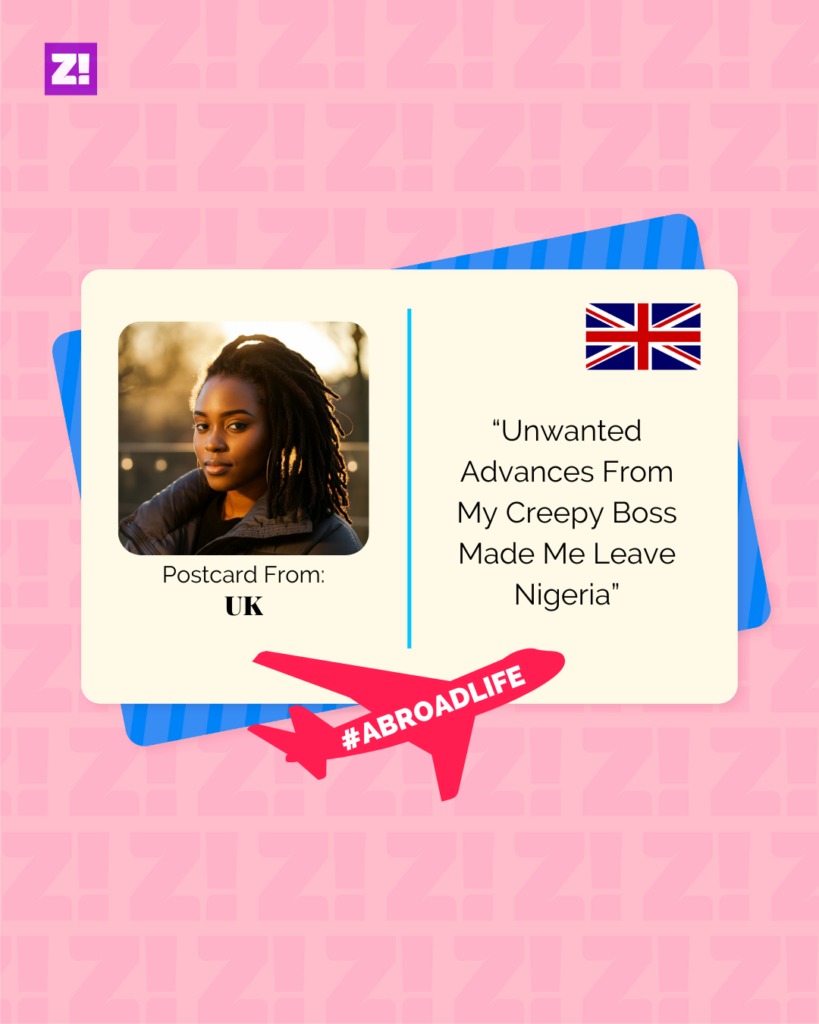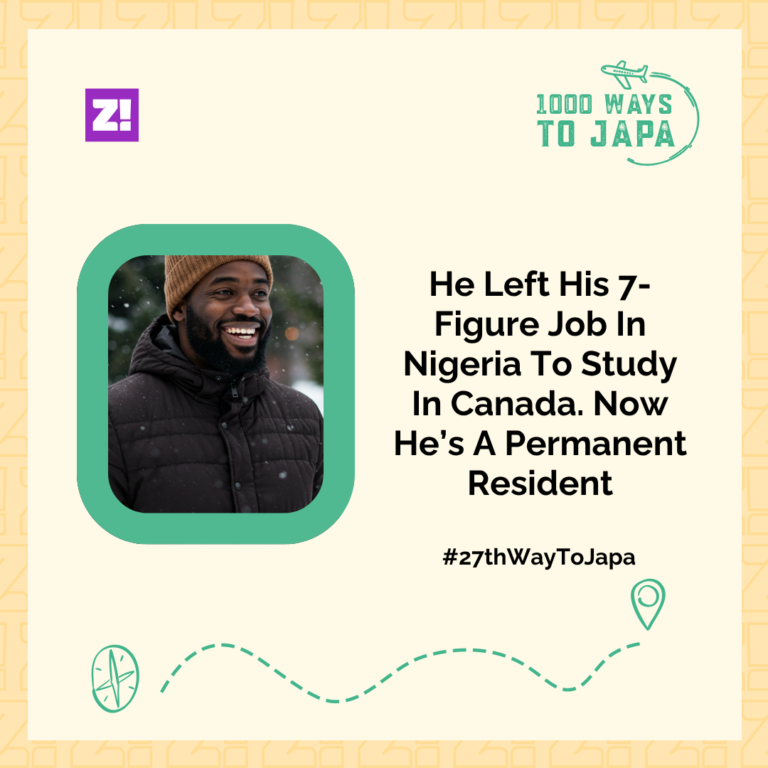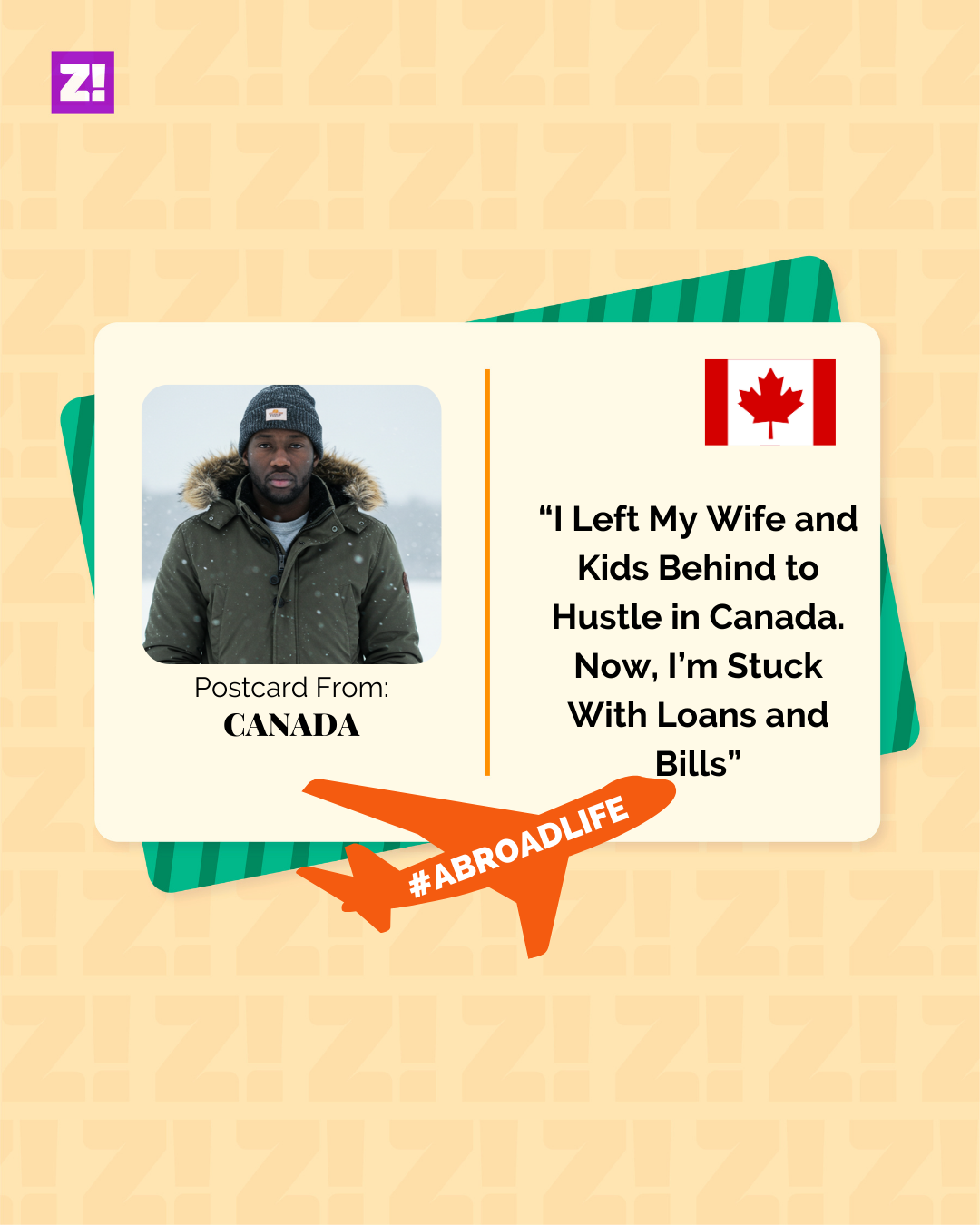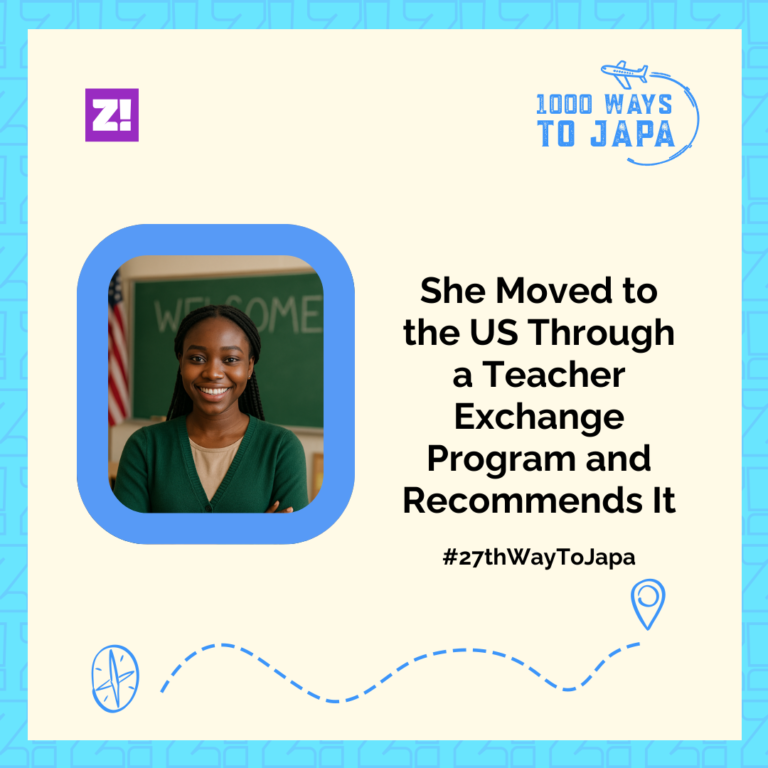The Nigerian experience is physical, emotional, and sometimes international. No one knows it better than our features on #TheAbroadLife, a series where we detail and explore Nigerian experiences while living abroad.
Kaima (26) turned down advances from a creepy boss who made her life difficult and moved to the UK alone. In this week’s Abroad Life, she talks about how living in the UK has changed her approach towards religion and how she’s been navigating marriage in a new country.

When did you leave Nigeria, and where do you live now?
I left Nigeria in 2021 through the study route. I live in the UK now.
Is there any particular reason why you left the country?
At that point in my life, I couldn’t figure out what I wanted to do with my life in Nigeria. It felt like I was stuck following the same old pattern everybody followed–complete your NYSC, start looking for a job and pray that life gets better from there.
I also didn’t want to find myself in a position where I would finish my NYSC and start hoping that my Primary Place of Assignment (PPA) would retain me. The PPA in question had started to feel like a nightmare at the time too. I was working with one egoistical and creepy boss. I just didn’t want to find myself in a position where I wouldn’t have any other option than to be at his mercy or the mercy of the job market so I decided I would explore and leave the country.
Plus, I really wanted to be independent because, at that point in time I was living with my auntie, and the living situation wasn’t the best. I guess I wanted to feel like a proper adult if that makes sense.
Do you mind telling me more about your boss?
He used to make weird advances at me. He would always ask me out or try to get me to go on dates with me, and it just felt a little inappropriate.
The job had a weird arrangement, too– It wasn’t letting me put any of the skills I had to use. Plus, he had this weird ego trip that didn’t help matters either–. He used to send me on errands that had nothing to do with why I was working there. There were times when he sent me to go and buy stuff or put on the generator, and soon, It went from errands to petty rules that made no sense.
He wasn’t always in the office, so he made it compulsory to call him when I got to the office and before I left the office. Then he would say things like, “You’re no longer allowed to take any excuse.” I remember one time I went out for lunch, and when I say that I went out for lunch, I mean that I literally just went to buy food at the end of the street. He got to the office and found out that I had stepped out, and he started yelling. It was past 3 pm, and I hadn’t eaten all day, so I didn’t get where the outrage was coming from. He just kept yelling and talking about how I wanted him to show me his ugly side. That kind of behaviour among employers has become normalised in Nigeria, and I just couldn’t deal.
Apart from my boss’s misbehaviour, there was also the NYSC side of things, in the sense that everything just seemed like a power trip. Even something as simple as monthly clearance becomes a nightmare. You can show up at your local government with the hope of thumbprinting and end up not being able to do so because your local government instructor isn’t in a good mood or got mad because of some petty reason.
The decision to leave Nigeria was the result of all those experiences combined with my dissatisfaction with my work and personal life.
So is life different in the UK?
Yes, completely different. For instance, your work relationship with your boss is healthier. Don’t get me wrong, I know there are a lot of good bosses and healthy workplaces in Nigeria, but here, things are more professional. You’re not at the mercy of your boss, and they treat you like a normal human being.
That’s good to know. You mentioned that you left Nigeria as a student; how’s that going?
I’m done now. I graduated in 2022.
Congratulations. How has life been since then?
It’s been amazing. I’ve figured out what I wanted to do and the field I wanted to go into. I’ve also been able to find all of the resources and all of the help I need to advance in my career at the tip of my fingers.
My life is much more interesting, and I feel at ease. Back home, when I was always stressed or worrying about one thing or the other, it reflected in the way I approached religion. Now that I’m in the UK, how I pray has changed. I’m no longer praying for the basic things of life.
Can you tell me more about that?
Back in Nigeria, I was praying for things that nobody should have to pray for. On days I have to go for my monthly clearance, I’ll say, “God, please let my LGI thumbprint for me today without stressing me”. When I’m stepping out of my house, I’ll say, “God, please, don’t let me get into any accident; may evil not be my portion.”
I’m not saying that being in the UK automatically means you’re safe from accidents, but I don’t really see the need to pray that way anymore. I also used to pray for money in Nigeria. Sometimes, I even prayed to God about wanting someone to send me as low as ₦10,000. Those were valid needs, but they haven’t featured in my prayer since I moved to the UK three years ago. This place just has a way of making life easier for you.
I’m curious though, how did your parents feel about you making that mature decision to leave everything you knew in Nigeria to move to the UK?
I was very intentional about moving to the UK alone. My family took the news well, and they supported me. My dad has never been a fan of japa, but he understood that it was a decision I was making for myself, and he supported me. Even some aunties and uncles supported me financially. The decision was also easier to make because my boyfriend at the time, who is now my husband, was in the UK. He was very supportive too. I had a lot of support so that made moving alone less scary. But I would say that the first year after moving was not easy.
How so?
I was still paying off my school fees so there was a bit of financial stress. I was also in an entirely new country, and I didn’t know how many things worked. I didn’t have any friends, and I was an introvert.
Back in Nigeria, I struggled to make friends, too, so I just used to wait until I met one nice extrovert to take me under their wings, but that was harder to find in the UK. It also didn’t help that I was the only Nigerian in my class. I was actually the only black person in my class, so I felt like I was on my own.
At some point, I stopped focusing on not having friends and started channelling that energy into getting a job because I still had school fees to pay. Being a student, I was only allowed to work part-time but the job offers I was getting were full-time offers. They didn’t want to hire anybody part-time, so I found myself working in a retail store. As somebody who had never done a menial job, I struggled.
I had to do a lot of heavy lifting, and I just couldn’t deal. I remember my first night at the job, I actually started crying because I was not used to it. Everything just felt so heavy, but after a while, I got used to the whole thing so that became less of a problem.
But the fact that I didn’t have friends or my family around still made things hard for me. I became very depressed because of that, actually. The depression got worse during my first winter in the UK. The cold had a way of making me feel alienated from everything I had ever known but I think after the first year, especially after I graduated, I started enjoying my stay here in the UK.
What changed after graduation?
After graduation, I started volunteering for proper jobs. I was also relieved of the stress of writing my thesis and doing menial jobs. So after graduation, I had more time to focus on getting a full-time job and learning to enjoy my own company. I also had more time to actively step outside of my shell and start making friends.
You mentioned that you got married. How did that happen?
I’ll have to give you a backstory. He was actually the one that encouraged me to do my Masters outside the country. I’ve always wanted to study abroad, but I didn’t know how. I’m not from a rich family, and I wasn’t financially stable either, but he asked, “Why don’t you just get your international passport?” So I did that, and then he was like, “Why not just write your English proficiency test?” I did that too. Later, he said, “Maybe you should start applying to schools” Then I decided to try; the entire application or relocation process was just me trying my luck.
Before I knew it, I was already in the UK. He was also very financially supportive throughout the move. Then I moved here, and we continued dating, but we lived in different cities. After I graduated, we moved in together and got married,
Congratulations. I’m guessing that’s one of the good things that happened after graduation.
Yeah, it is. For the entire duration of the study, he was my only friend. It was helpful to have someone because, on days when I was just overwhelmed, he was there to help me get back on track.
Let’s talk a little bit more about married life. How’s that going?
It’s been really good. One thing I’ve always wanted is to marry a Nigerian. I don’t quite like change, so I love that my husband has a solid idea of who I am and where I’m from. I don’t want to spend all day at work speaking through my nose for my British colleagues to understand me and still not be able to speak freely with my husband. It’s also important for both of us to maintain our Nigerian roots.
We’ve been talking about having children, and we want to make sure that they know who they are so they don’t end up having an identity crisis. We’re not parents yet, but I think it will be tricky trying to strike that balance between life in the UK, which is primarily what the children will know, and our Nigerian roots.
Now that you’re starting a family in the UK, is there any plan to move back to Nigeria in the future?
No, we are not considering that. Even before I got married, I knew I wanted to stay in the UK. That’s why I was intentional about getting a job before my student visa expired.
Is there anything about the UK that still shocks you sometimes?
There are things that still surprise me about living here. People can be very nice, but they can also be passive-aggressive. In Nigeria, I’m used to people being straightforward, but here, sometimes, if someone is being passive, it might be for you to understand that they just don’t like you. Nigerians are more open and bold with their emotions.
But I’ve noticed good things too. For example, everybody opens the door for you. It’s those small social cues. I had to pick up too, when I moved. Even if someone is 100 meters away, you’re kind of expected to hold the door open for them. It took a while for me to get the idea, but I’m getting used to it.
I think the hardest part is just having an identity crisis. . I miss being in Nigeria, where everybody around me is Nigerian. I never had to code switch, all of that. I guess that’s why the friends I made in the UK are Nigerians.
I’ve travelled home a few times in the past couple of years; it just feels relaxing. I can relax and just be myself but in the UK, I always have to switch my accent when I go to work or anywhere else. When I get home after a long day of speaking like I foreigner, I always feel the joy of removing a nonexistent wig
I’m glad you have friends now. How did you end up meeting them?
My friends are mostly spouses of my husband’s friends. I met them, and then I was introduced to some other people. I also met some friends in church.
I have friends in Nigeria, too, but distance has been a barrier.
How happy are living abroad on a scale of one to ten?
I would say 9.5 because I miss my family. But I love my life in the UK.
Do you want to share your Abroad Life story? Please reach out to me here. For new episodes of Abroad Life, check in every Friday at 12 PM (WAT).




